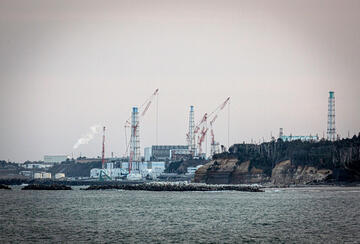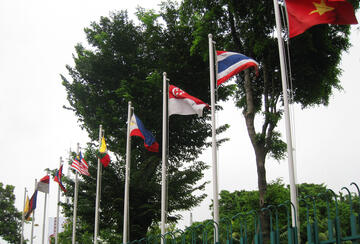The Kremlin Paints Itself into a Corner
As the crisis between Russia and NATO and Ukraine has developed over the past three months, the Kremlin increasingly has painted itself into a corner.

Biometrics have great appeal to those concerned with public health — but they can also be used for far darker purposes.

More than a decade after the Fukushima Daiichi Nuclear Power Plant (FDNPP) disaster, an international team of researchers uncovered critical new information related to the retrieval and management of fuel debris, the solidified mixture of melted nuclear fuel and other materials that lie at the base of the damaged reactors.

In her new book, Stanford scholar Amy Zegart examines the evolution of the U.S. intelligence community and how technology is changing how it operates.
Paul Edwards and eight other faculty from Stanford and SLAC are among the 564 new Fellows of the American Association for the Advancement of Science.
The U.S. and its partners have sent weapons to Ukraine. They've provided political and moral support. But if Russia invades, Ukraine's army looks to be largely on its own against a stronger force.
Armed with Internet connections rather than security clearances, scholars, hobbyists and conspiracy peddlers are forcing intelligence agencies to rethink how they do business.

President Joe Biden’s administration is conducting a missile defense review in parallel with its Nuclear Posture Review (NPR). Those reviews will determine whether to adjust the nuclear and missile defense programs that the administration inherited from its predecessor.

"These sorts of offense-defence races have been taking place globally for many decades now, and what we consistently see is that offence has the advantage," said Cameron Tracy, a researcher at Stanford University's Center for International Security and Cooperation.

During the last two months of 2021, Russia created a crisis by deploying large military forces near Ukraine and demanding security guarantees from the United States and NATO.

Today’s security environment calls for a renewed commitment to nonproliferation. No country alone can reverse adverse developments in Iran and dissuade others from seeking nuclear arsenals. Effective nonproliferation efforts must be global. But distrust among NPT members may prevent the necessary coordination.
How Fake Spies Ruin Real Intelligence
Spy-themed entertainment is standing in for adult education on the subject, and although the idea might seem far-fetched, fictional spies are actually shaping public opinion and real intelligence policy.

As Russia increases its military presence along the Ukrainian border, Stanford scholar Steven Pifer discusses what Russia hopes to achieve and why its policies toward Ukraine are backfiring.
In this Q&A, Lin discusses his recently released book Cyber Threats and Nuclear Weapons. He explains that until this publication, the literature about cyber technology’s impact on the nuclear enterprise has been relatively sparse.

In 1991, some 50 years after NATO’s establishment for the defense of Western Europe against a Soviet military threat, the Warsaw Pact disbanded and the Soviet Union collapsed.
The abject failure of Russian policy toward Ukraine over the past seven years suggests Vladimir Putin has a flawed understanding of the country.

Russia maintains the world’s largest nuclear arsenal and the most powerful conventional military forces in Europe. Russian military units currently are deployed — uninvited and unwanted — in Ukraine, Georgia, and Moldova.
As Russian troops gather on Ukraine’s borders, the outstanding question is whether Russian President Putin is prepared to bear the domestic and international costs of a full-scale invasion or if he’ll stop at pressuring NATO and the West for political concessions.
China’s state-linked influence operations get very little engagement on Twitter.
I have struggled to find something with which I disagree in Michael Fischerkeller’s response to my thought experiment adopting the 2018 U.S. Cyber Command (USCC) Command Vision. A couple of such points are addressed below, but for the most part I agree with him. He does make one claim that I find surprising.
Is Russia preparing for war?
As Russia builds up forces near Ukraine, it continues to insist its troops are there simply to conduct military exercises. While exercises are routine, they have also historically been used by Russia and others to prepare for war and to cover up plans for surprise attacks.

President Xi Jinping recently announced that China wants to adhere to Southeast Asia’s nuclear-free zone “as early as possible" to become the first nuclear state to join the pact. Musto finds that Xi wants to act now in order to distract from China’s nuclear build-up and, more importantly, counter the AUKUS security partnership.

US President Joe Biden and his Russian counterpart Vladimir Putin spoke via video link for around two hours on December 7 in a hastily arranged virtual summit to address international concerns over a major Russian military build-up along the country’s border with Ukraine.











